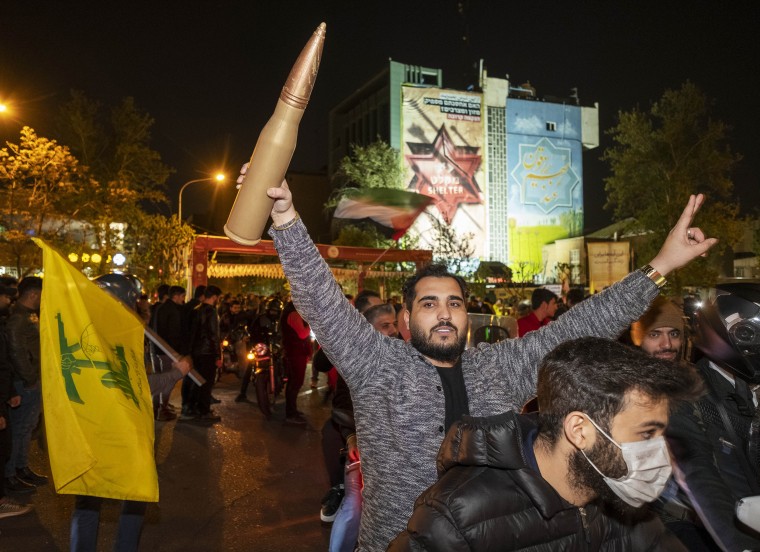Iran’s retaliatory strike on Saturday — which invaded Israeli airspace with hundreds of drones and missiles, causing relatively limited damage — was unprecedented but calibrated to show deterrence without provoking an all-out war, according to experts who spoke to NBC News .
Just hours after the attack, Major General Mohammad Bagheri, chief of staff of the Iranian armed forces, issued a statement saying the attack had “concluded and we are not willing to continue it.”
An Israeli official in the prime minister’s office told NBC News on Sunday that “Israel will consult with all its partners, but ultimately it is up to Israel to decide what the response will be.”
“Israel cannot allow such a large attack against Israel without some kind of response, whether small or large,” the official said. “It’s up to the war cabinet to decide now.”
US officials had anticipated a response from Iran since the April 1 bomb attack carried out by Israel against an Iranian diplomatic complex in Damascus. They raised questions not just about the severity of the threat, but about how Israel would respond given an overall military strategy that a senior administration official and a senior defense official, referring to internal conversations, characterized in interviews with NBC News as poorly considered. , “frenetic”. ”And with the potential to be “catastrophically scalable”.
“I don’t think they had a strategy,” the senior administration official told NBC News of Israel’s bombing of Iran’s diplomatic compound in Damascus. “Israelis don’t always make the best strategic decisions.”
Israel views Iran as an existential threat and has clashed with previous US administrations over how to deal with the regime, which does not officially recognize the Jewish state. Most notably, Netanyahu openly lobbied against President Barack Obama’s historic 2015 nuclear deal with Iran, from which his successor, Donald Trump, withdrew.
Iran, for its part, has been the target of a concerted US and Israeli campaign to degrade its military capabilities, with attacks that have killed senior commanders working with proxy forces across the region and nuclear scientists in the country.
‘Sleepwalking’ into war?
While the White House believes the Israelis are not seeking a broader conflict or outright war with Iran, especially given the resources they have to fight in Gaza, U.S. officials cannot be sure , said the senior administration official.
“There is an urgency to act,” said the official, “and that is what happened in Damascus,” referring to the April 1 attack on the consular building that killed two generals and five officers of the Iranian Revolutionary Guard Corps. The official said it is the same frustration that American officials feel with the way Israel operates in Gaza.
Fawaz Gerges, professor of international relations and Middle East politics at the London School of Economics, criticized Biden’s ability to translate his concerns into influence over Israel’s military decision-making.
“The Biden administration’s strategy has failed miserably. Biden is sleepwalking the US into another catastrophic war in the Middle East. Its overall objective of preventing the war in Gaza from spreading to neighboring countries has failed,” said Gerges. “Biden was unable to influence Netanyahu’s decisions either in Gaza or in relation to Iran.”

Benjamin Friedman, political director at the think tank Defense Priorities, said in a statement that “the Israeli government has courted a fight with Iran, perhaps encouraged by the prospect of US aid to pursue Iran.”
“Instead of talking about ‘firm’ support for Israel, the president should have made clear that U.S. support is limited and does not extend to all circumstances,” Friedman said. “War with Iran would endanger U.S. security without any obvious payoff.”
Washington-based Defense Priorities advocates restraint in US foreign policy.
Regardless of the relative caution that American officials advocated, a US military official told NBC News that US forces in the region continue to shoot down drones launched by Iran against Israel. “Our forces remain positioned to provide additional defensive support and protect U.S. forces operating in the region.”
In a statement released today, Israeli Defense Minister Yoav Gallant warned that the confrontation between Iran and Israel “is not over yet. … We must be prepared for all scenarios,” and he called Iran “a terrorist state.”
For Iran’s part, Amal Saad, a professor at Cardiff University’s School of Law and Politics who specializes in studying the Iranian-backed Lebanese political movement and the Hezbollah militia, warned against interpreting the limited destruction caused by Iran’s attacks as a reason for reject the country’s policy. intentions or willingness to come into conflict with Israel if provoked.
The attacks, which closed schools and sent thousands of Israelis into bunkers as sirens blared, rockets passed overhead and fighter jets roared, were deeply disturbing in Israel, and their scale showed that “Iran’s strategic patience was exhausted.” ,” Saad said, referring to Iran’s tactics of military containment and deterrence.

Iran, Saad said, was humiliated by Israel’s bombing of its diplomatic complex, and national dignity is “one of Iran’s fundamental values.” It would have been impossible for Iran to “absorb that kind of humiliation,” she said. This “would mean that Iran is no longer Iran”. New attacks from Israel could inflame an Iran that is already at its limit.
This desire was clearly underlined by Bagheri, Iran’s military chief of staff, whose statement said that “if Israel attacks our interests, we will respond with force and our next operation will be much larger”.
“The bottom line is that the Middle East appears to be descending into a wider regional war,” said LSE’s Gerges. “For now, the ball is in Israel’s court. Israel’s next move will determine whether the region moves toward further military escalation or de-escalation.”
This story originally appeared on NBCNews.com read the full story





































/cdn.vox-cdn.com/uploads/chorus_asset/file/25469507/Teen_Limits_One_Screen.jpg?w=150&resize=150,150&ssl=1)
